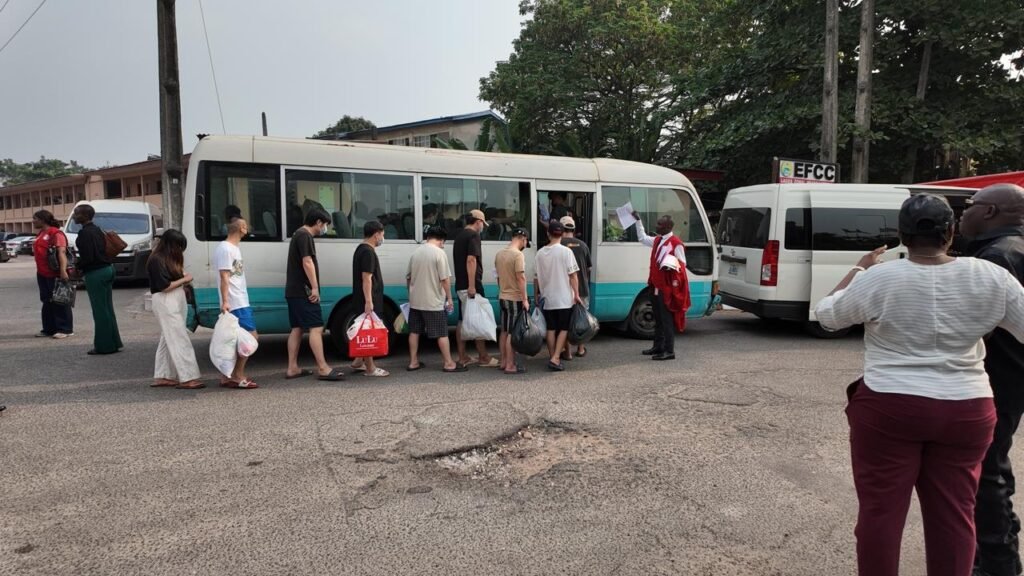The Nigerian Immigration Service (NIS) on Sunday began the deportation of 42 out of the 192 Chinese and Philippine nationals convicted of cyberterrorism and Ponzi scheme offences.
The first batch of 42 deportees, who were among the 759 people arrested during a massive operation on December 10, 2024, at Oyin Jolayemi Street, Victoria Island, Lagos, was set to leave Nigeria at 2:00 p.m. local time.
Chronicle NG gathered that all convicted foreigners were sent to the Nigeria Immigration Service.
The deportation procedure is taking place in stages; others will be repatriated on Monday and Tuesday until all have returned to their home countries.
The syndicate had been running a large-scale cyber fraud and Ponzi scam before being apprehended in the combined operation.
A senior immigration official at Lagos’ Murtala Muhammed International Airport confirmed the development to our correspondent on Sunday on the condition of anonymity, saying all of the convicts had been handed over to the Nigerian Immigration Service for deportation, noting that the operation was carried out with minimal public attention for security reasons.
The officer indicated that the move was part of the Nigerian Immigration Service’s usual enforcement to ensure a secure border.
The officer said, “Whether it’s a criminal offence or a visa violation, anyone who has served their jail term is typically deported. Even if someone holds a valid immigration status, certain crimes automatically render that status void.
“In this case, these individuals were not deported for immigration violations alone but for criminal activities. We cannot allow foreigners to commit crimes in our country and have Nigerians take the blame for their actions.”
Another senior official within the service, who also spoke on the condition of anonymity, said the agency is monitoring other foreign nationals suspected of similar offences.
“This is part of an ongoing operation to ensure that Nigeria’s borders remain secure. We are focused on results, not public recognition. Our duty is sensitive, and we act within the law to maintain national security,” the officer stated.
While the specifics of the crimes committed were not revealed, sources stated that the deportations were carried out in accordance with legal laws and following due procedure.
When contacted to determine the exact reason for the offenders’ deportation, a senior staff member of a sister agency, who offered to speak only on the condition of anonymity because he lacks the authority to do so, emphasised that no criminal would be allowed to commit a crime in Nigeria and then flee to their home country.
He added, “You know, for immigration service, they do their jobs not for a form of validation to ensure that our mandate stipulated by Nigerian laws is followed to the letter. I don’t know their reason for keeping quiet on this, but I know that it is the nature of the service to continue to work underneath to secure our borders.
“These nationals committed criminal-related offences and not visa-related offences. We must send them back to their countries; they can’t be here committing crimes, and people would then think it is Nigerians doing that. We won’t allow them to do that in our country.
“We still have some of them we are watching; we are only result-orientated and not interested in public opinion because a security job is a very sensitive one.”
The Economic and Financial Crimes Commission (EFCC), which prosecuted the cases, disclosed that the convicts had operated an extensive cyberfraud and Ponzi network.
The EFCC chairman, Mr Ola Olukoyede, described the deportations as a “significant milestone” in the country’s war against corruption.
“These convictions send a strong signal that Nigeria will not serve as a haven for cybercriminals.
“The commission remains committed to intensifying investigations, recovering stolen funds, and restoring national dignity in line with President Bola Tinubu’s anti-corruption drive,” he said.
The EFCC charged the prisoners with using fictitious identities to swindle victims, teaching Genting International Co. Limited personnel fraudulent practices, and violating the Advance Fee Fraud and Other Related Offences Act of 2006.
“These offences were calculated to undermine Nigeria’s security and financial integrity.” Their successful prosecution represents a turning point in the fight against transnational financial crimes,” Olukoyede added.









